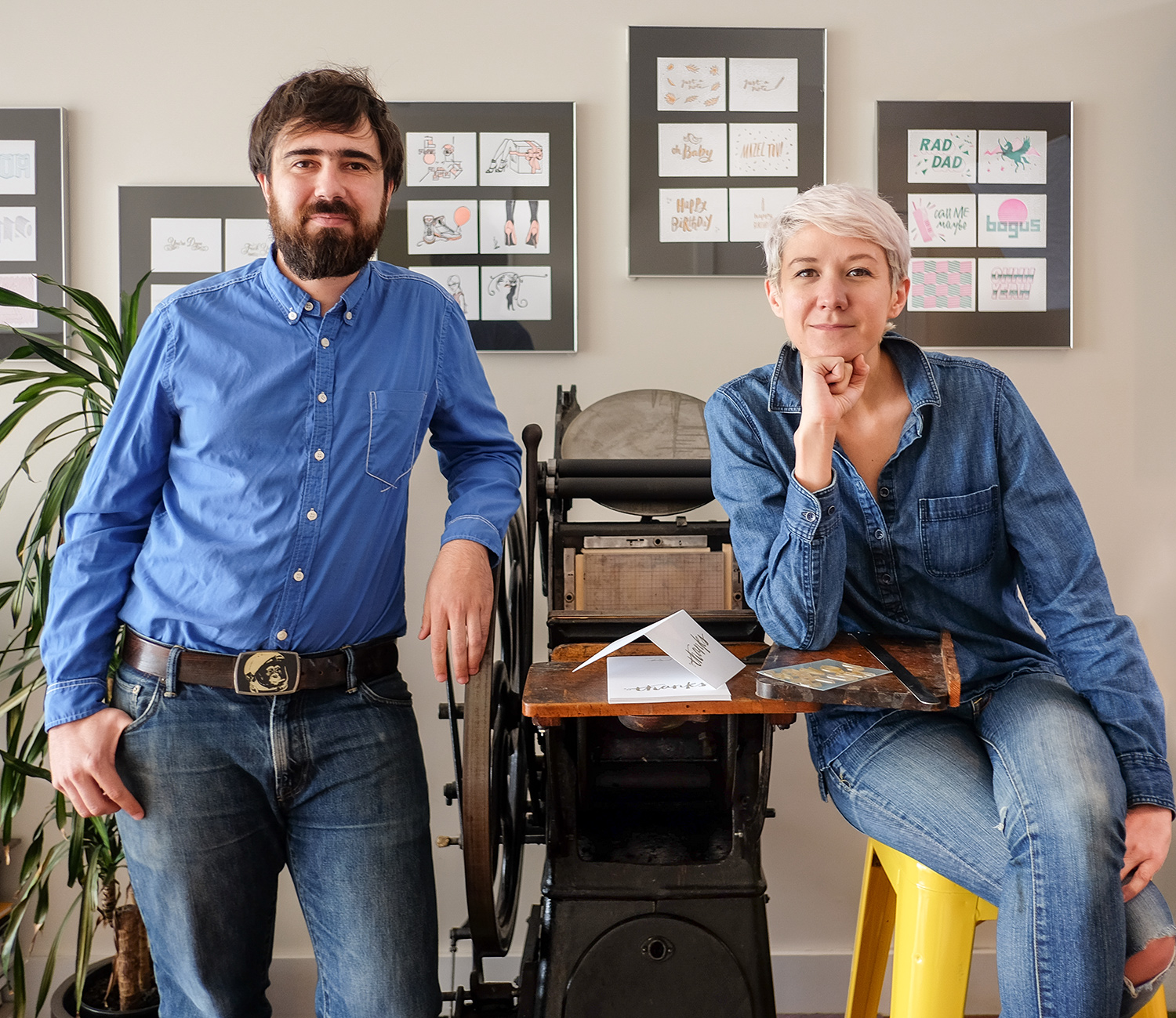
Mail that makes memories
Born from a desire to give people moments to make memories, Punkpost is a fresh take on the time-honored art of greeting cards. It was created by Lex Monson and her husband, Santiago Prieto, who rely on their strong partnership through the exciting but challenging journey of entrepreneurship. To protect their new brand, they applied for and received a registered trademark. Now they concentrate on what really matters to them—building the business they love and helping their customers connect in an innovative way.
15 min read
Each month, our Journeys of Innovation series tells the stories of inventors or entrepreneurs who have made a positive difference in the world. Hear it in their own words or read the transcript below.
Lex Monson: Honestly, I’ve just always wanted to own my own business ever since I was really young. I know that might sound a little corny, but it’s true. I don’t know. There was just something about making all these insanely small to insanely huge decisions, and building something that you really love and believe in that was attractive to me.
Megan Miller: And build something, she did. Lex Monson, along with her husband Santiago Prieto, created a personalized twist on greeting cards, making meaningful connections easier, and a little more creative, one customer at a time. Along the way, they navigated the ups and downs of starting a business together, and forged ahead with a humble approach dedicated to constant improvement. They’ve carved out something unique, building a community of likeminded creatives who make up the Punkpost family of artists.
Their hard work, and a little bit of good luck, led them to secure protection for their handcrafted endeavor with a registered trademark.
I’m Megan Miller from the United States Patent and Trademark Office. I had a conversation with Lex and got the inside scoop on how she and Santiago found their way. Here is a bit of our conversation.
"[O]ur whole idea was always to make products that make memorable moments for people."
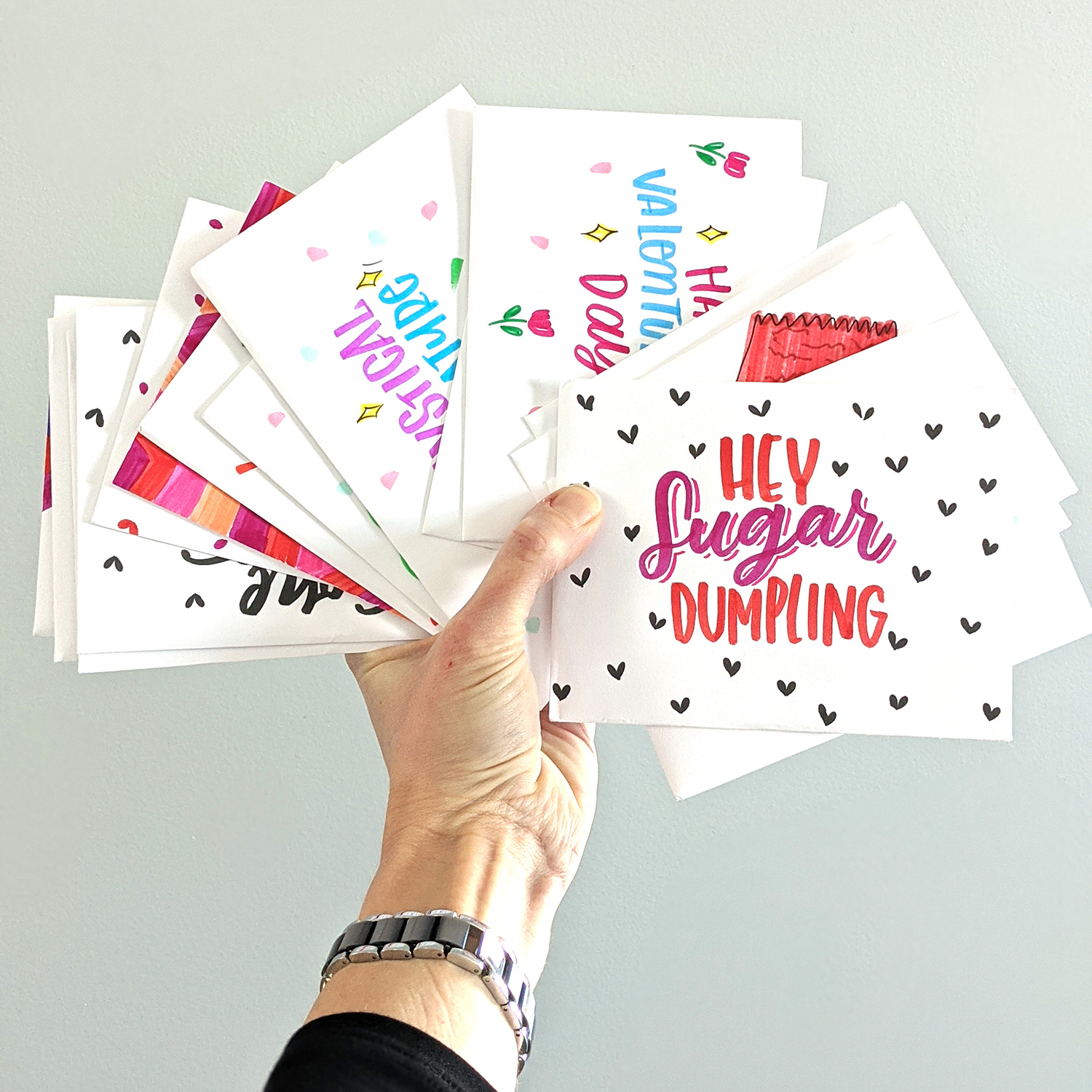
Punkpost's brand might be spunky and lighthearted, but Lex and Santiago have put serious thought into building and protecting it. "Your brand is part of your value. It's a big part of your value," Lex explains. As part of their brand protection strategy, they applied for and received a federal trademark registration. Photo courtesy Lex Monson/Punkpost.
Megan Miller: Tell me a little bit about Punkpost.
Lex Monson: So Punkpost, in short, is a way to easily send handwritten cards. But where it’s different than anything else that’s out there is that we actually have a team of artists around the U.S. who will take that card, design and handwrite your message in it, put a stamp on the envelope, and put it in the mail for you. So we kind of just started it as a way for people to make good on their good intentions. I think we all love receiving cards, and a lot of us like sending them, too. But sometimes, all the little steps add up to too much, so that card doesn’t get in the mail. So we just wanted to make it easier for people.
Megan Miller: So Punkpost removes some of the barriers that keep us from sending greeting cards. How did you realize that you could build a business around solving that problem, and how did you know there would be an appetite for it?
Lex Monson: Yeah, that’s actually a great question because I think a lot of people assume when you start a business, you just kind of go all in, which me and my husband, who’s also my business partner, kind of did, but we actually had had some other ideas that we were kind of throwing out into the world beforehand. Like, we made DIY piñata kits, and we made wedding piñatas, and we made bottle openers. But those were kind of just side things we were dabbling in.
Honestly, I’ve just always wanted to own my own business ever since I was really young. I know that might sound a little corny, but it’s true. I don’t know. There was just something about making all these insanely small to insanely huge decisions, and building something that you really love and believe in, that was attractive to me.
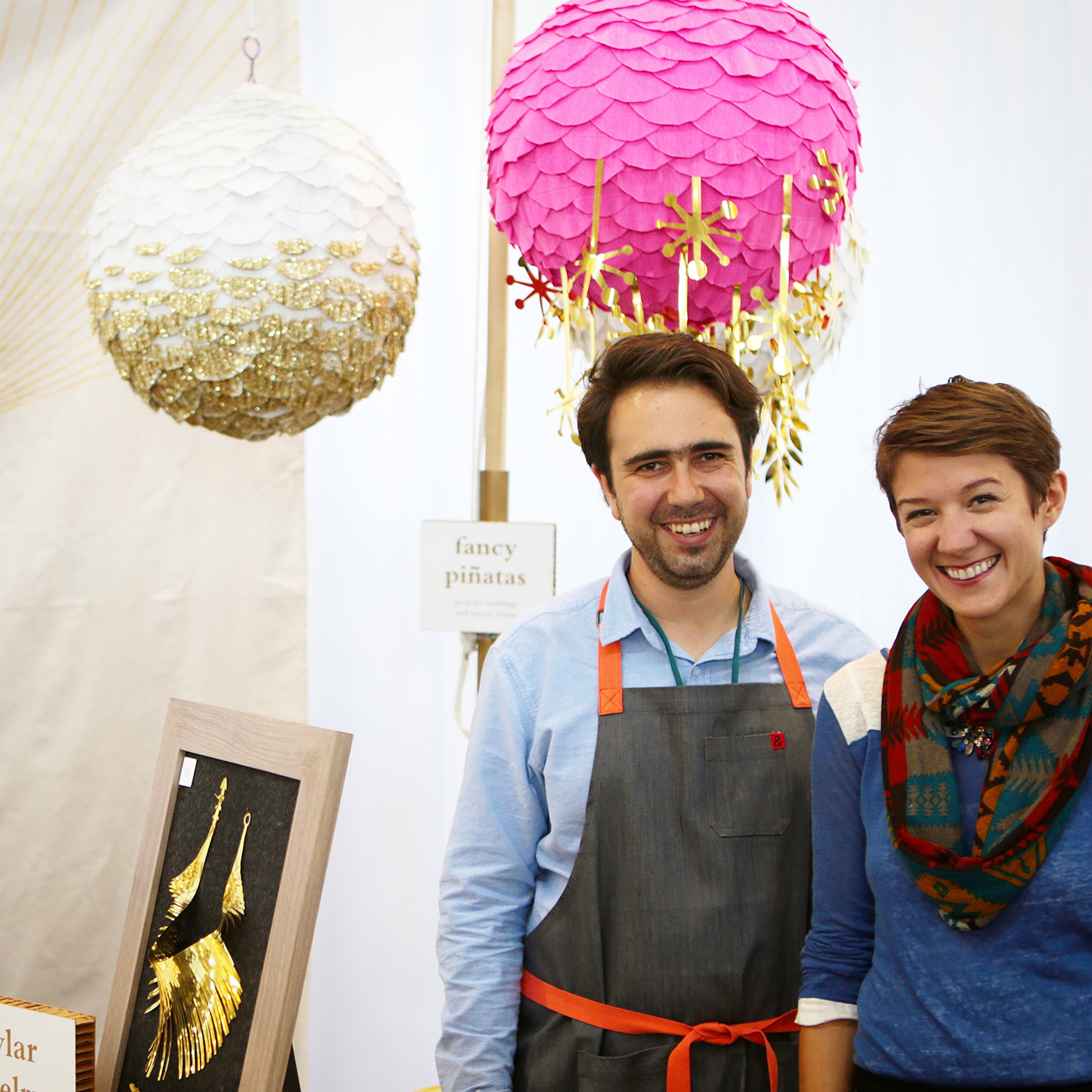
While selling their earlier products, Lex and Santiago were shaping and testing their idea for an easier way to send greeting cards. After potential customers responded enthusiastically to an early version of Punkpost, the couple put their plans in motion. Above, Lex and Santiago sell piñatas in 2015 at the Brit+Co ReMake in San Francisco. Photo courtesy Lex Monson/Punkpost.
And then we had this idea for Punkpost, and we personally really, really liked it. And we see people sending and receiving cards all the time, and how it was a really important way for people to show up when they can’t physically show up. So anyway, I guess to toot our own horn, we were just like, "We really like this idea." But we didn’t just take that as like, "This is what we’re going to put all of our focus on and quit our jobs for."
So what we did, we took it to one of those crafty trade shows, and we were selling our other items, but then we had a separate booth just where Punkpost was. And we were like had, it was just built on a Squarespace site. So it was just kind of like a frame of what it is now. And we were like, "You can go on here, pick a card, type your message, and we’ll handwrite it for you." So we just did that to test what the appetite was. And people were so excited about it and thought it was so cool. So just taking it out in the public and having people who were strangers to us and didn’t know about us or our ideas test it was super awesome, and gave us the confidence to be like, "Yeah, we like this idea, and it seems like other people do too." So, we went for it.
Megan Miller: How has Punkpost evolved since those early days? Was it always your vision to reinvent how people send cards?
Lex Monson: Well, I think just backing up a little, everything we wanted to make, we really wanted—even with the piñata kits and bottle openers—our whole idea was to give people moments to make memories. So hitting a piñata with your friends is really a memory you’re going to have forever. Or even just opening bottles of beer or soda and sitting around and chatting. So our whole idea was always to make products that make memorable moments for people, and so Punkpost—the cards do make memorable moments. They totally can turn someone’s day around. And they really do have a lot of power. So that kind of already played into things we really cared about.
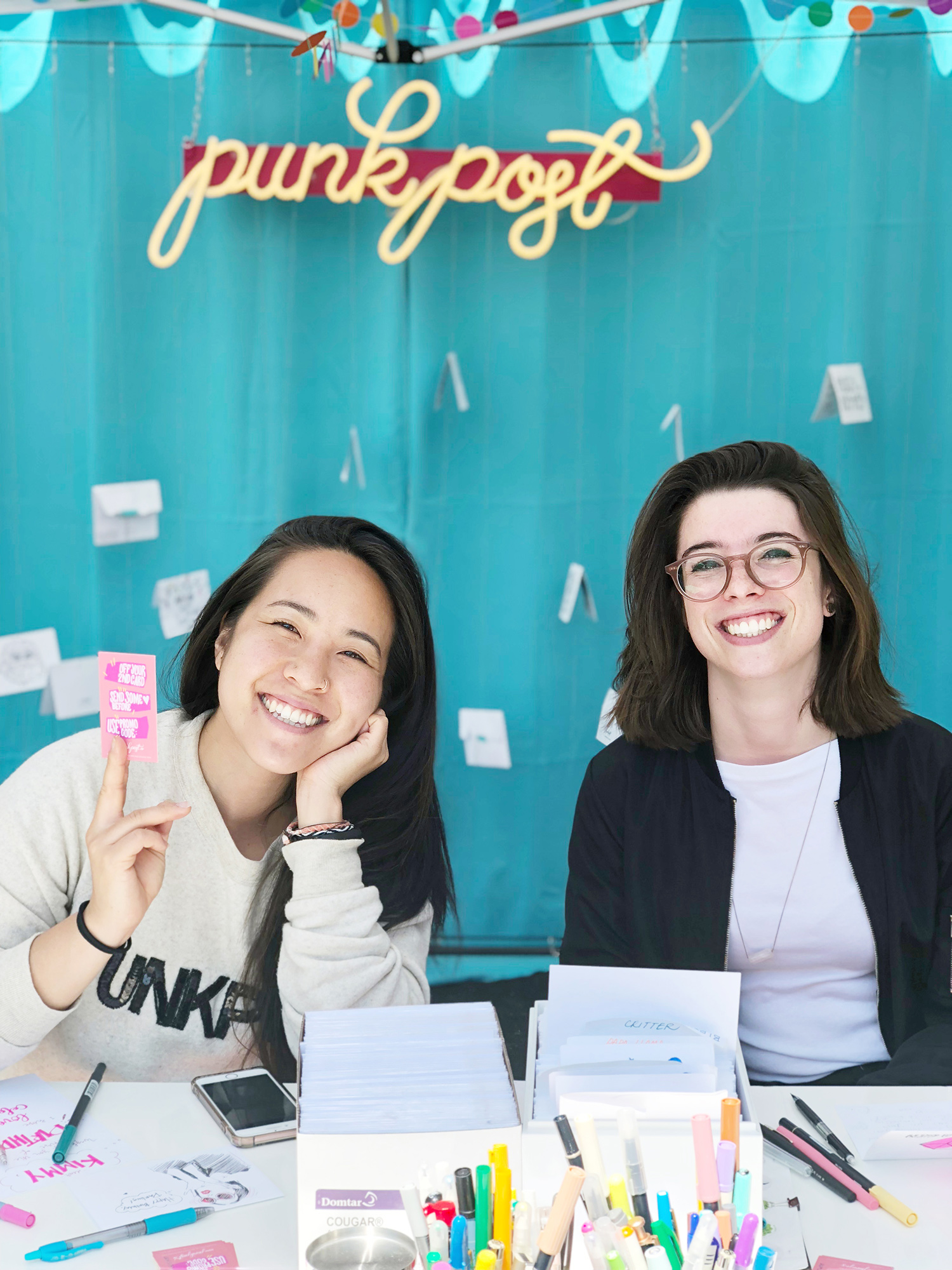
The artist community is a pillar of Punkpost, and Lex says that the artists truly believe in Punkpost and what it does. Above, Punkpost artists Kiri Inouye and Madeleine Salem represent Punkpost at the Urban Air Market in Oakland, California in 2018. Photo courtesy Lex Monson/Punkpost.
And then I guess we just wanted it to be easier for people to send cards. I was already guilty of this. I was this person who would buy greeting cards, I’d find a greeting card—for example, I still have this one, which I’ve had for probably like six years, which is kind of embarrassing—but I found this greeting card for my brother for his birthday. And I was like, "This is such the perfect card for my brother." But I never, like three years passed, and I never sent it out. Because I’d always forget or, you know, it would be too late. So it was just obvious to me, everything is kind of changing. And we’re not trying to take away people writing their own cards. If you can get it together and can do it, I think that’s great. But you know, I think I see a lot of people—just the way we operate is different than maybe it used to be. So, just kind of innovating what was already out there just felt really natural to us.
When we started, Santiago and myself were writing all the cards with just our normal handwriting. And then we got to a point where we couldn’t do it anymore. And so we put out a Craigslist ad for like hand—like, "You want to write hand, write cards?" And we found this whole community of people who practice lettering, or snail mail art. So honestly, it started as our handwriting, where we would put little doodles, to these awesome artists. And that’s something else I think that we really liked—where you might not have time to write your own card, but your message was so important that you hired an artist to do it. So that kind of just evolved as our community of artists grew.
Megan Miller: Owning a business isn’t always an easy road. Did you have any failures along the way, or did you ever feel like giving up?
Lex Monson: Yes. I think the very first day we launched the app, we actually got a piece of press, which was super exciting, but the app was just crashing left and right. So that was such an exciting day and such a gut-wrenching day at the same time. And I do think there’s been a lot of times when we’re like, "Can we keep going? Is this a viable business?" And honestly, it’s like, the whole thing is a roller coaster. I mean, now we’re a little over five years in, and it feels a little more stable. But I think at the beginning you’re putting so much of yourself in it. And I mean, you still do. But it’s just different at the very beginning, where it’s like, you want it to work so bad and you don’t know if it is. And it’s just you at the beginning. I mean, not, maybe not everyone, but for us it was just us. So it felt—it’s very, I would say, emotional. I don’t have children, but I’m almost, I always tell people I can almost imagine. It’s like your child—you just want it to survive and want—you have so many hopes and dreams for it. So I think, just how emotional it is sometimes. Like, the roller coaster is a high high, and then a low low. So in those moments, you’re like, "Should we just quit?" But also there’s, I don’t know. There’s just almost this irrational drive that keeps you going, even when you feel like you shouldn’t anymore.
"[T]here's so much you can always do, no matter what your business is. You can always be making it better … for the customers, or for your team, or both."
Megan Miller: What is it like to build a business with your spouse?
Lex Monson: That’s a question actually a lot of people ask me. I think there’s some things that are really awesome about it. I think because it’s a person you trust probably more than anyone else. I think having a partner who is equally as committed and passionate about it—because I think it would always end up being this tandem thing where one of us would get to the point of exhaustion and just want to quit, and the other one kind of cheerleads you on to keep going. I honestly don’t think I could have done it with anyone else. But I think having someone you trust so much, you know each other so well, you know how to communicate. I think you can just get to the point of things quicker because some of this interpersonal stuff you already have figured out along the way. I think there are a lot of benefits to it.
Obviously, there are hard things, too, like living and working together, basically seeing this person 24/7. It’s hard to separate, like, "What is our life outside of Punkpost?" I think with time we’ve gotten better about it and, you know, taking the actual weekends and going for hikes. But, I think when you’re working and living together, it’s hard to turn off.
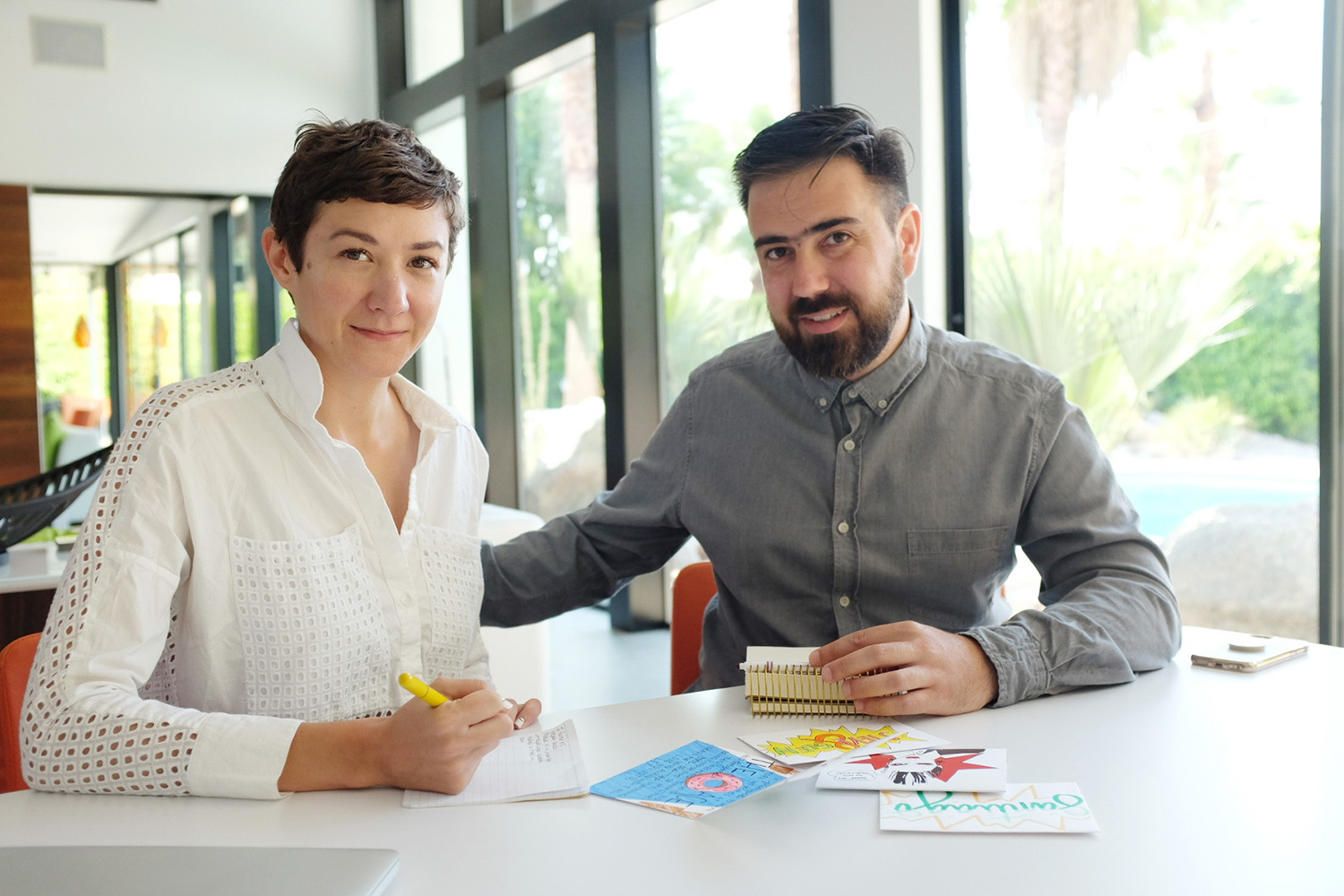
Above, Lex and Santiago work on cards in 2018. Before they hired artists to design and write messages, they personally handwrote every message. Photo courtesy of Lex Monson/Punkpost.
Megan Miller: Lex also credits her husband for coming up with the cheeky name for their business. But "Punkpost" is more than just a catchy phrase—it’s a trademark.
Even if you don’t know what trademarks are, you probably rely on them more than you realize. Imagine walking into a store to buy something you use every day—let’s say toothpaste. Do you buy the same kind every time? If so, a trademark might be what you look for when you’re trying to find that trusty tube in the aisle. You might see a variety of logos and brand names, but there’s one in particular that you want. When you find it, you know, "That’s my toothpaste. It’s made by the company I like, not the other guys." That’s how a trademark works—it identifies the source of goods or services and distinguishes them from the goods or services of another party.
Lots of businesses use trademarks. Some business owners, like Lex, apply to federally register their trademarks, which offers extra legal protection. During our conversation, Lex told me a bit about why a federal trademark registration was so important for Punkpost.
"[T]here are so many things to worry about when you have a business, that having that peace of mind [with a registered trademark] from the beginning is so important."

Punkpost is registered as a standard character mark. That means that the word "Punkpost" can be stylized with different colors or fonts and still be protected. Image courtesy Lex Monson/Punkpost.

The trademark on the back of this card tells you that it's a Punkpost card. Photo courtesy Lex Monson/Punkpost.
Lex Monson: Well, we have an awesome friend, and she worked in trademarking. And when we were talking about starting our business, and just naming it, she really encouraged us to trademark it. And she talked us through the reasons why. She personally had had a friend who started another business, and someone else had the business name. But they’d been building the business for a few years, and they had to rebrand everything. And it just, to me, sounded like a nightmare. Especially for us like—well, I think anyone starting a business—your brand is part of your value. It’s a big part of your value. So I think just from the start, she really encouraged us to protect that brand and protect our brand name. And making sure we’re starting off in a safe space, like in quotes. And I mean safe space by like, you’re—you know this name is available, and you know you can have it. I just think there are so many things to worry about when you have a business, that having that peace of mind from the beginning is so important. And checking it off your list, moving forward, continuing to build value around that brand is so important. And we even got an international trademark as well. So I highly recommend it to people.
Megan Miller: With a trademark registration checked off their list, Lex and Santiago could focus on what they love—helping their customers send meaningful messages to the people they care about. Any handwritten card speaks volumes to its recipient. But because there are so many ways to stay connected in the world we live in, a greeting card might not be the first thing that comes to mind when we have something to say. I asked Lex what’s so special about sending or receiving a card in the mail.
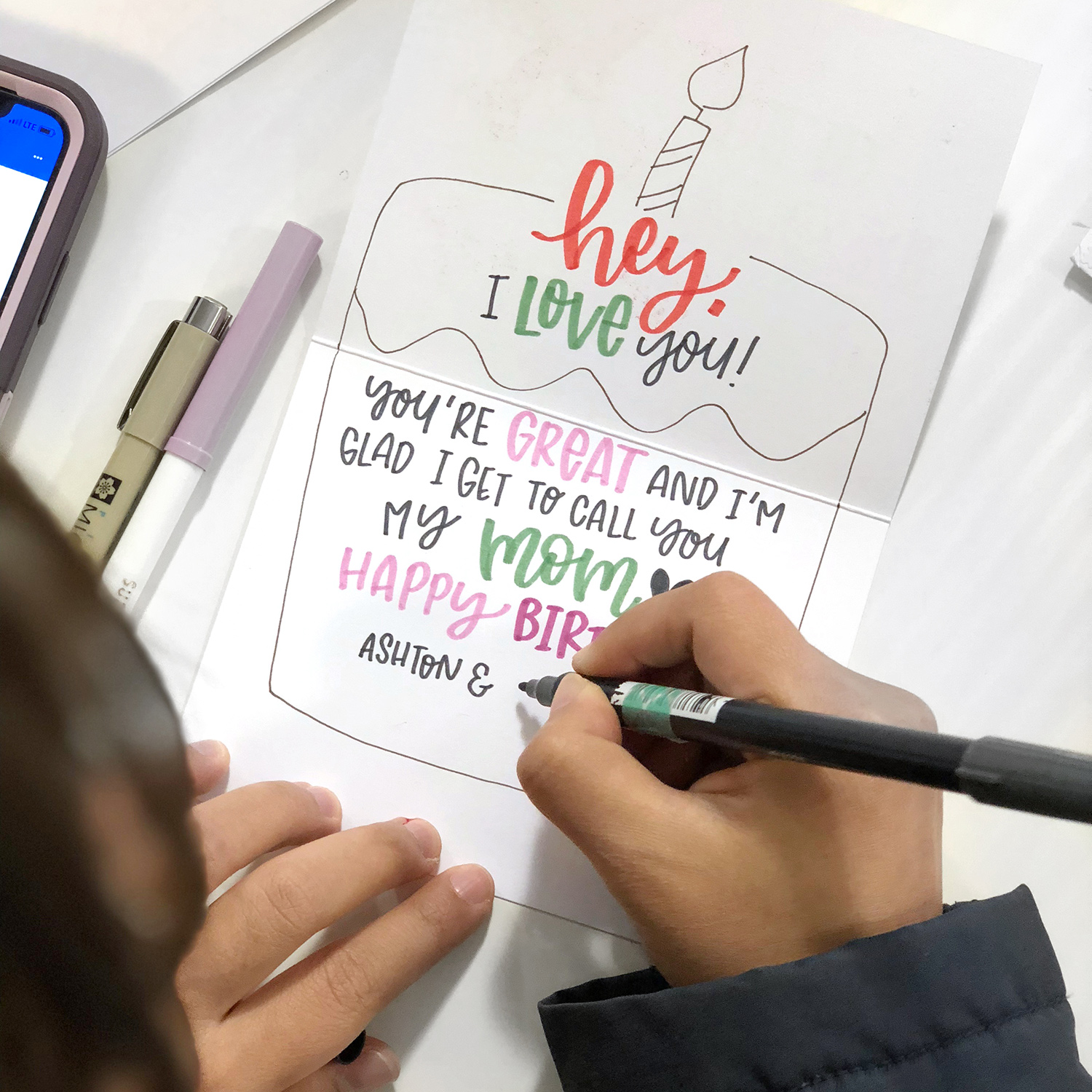
Punkpost artists bring life and creativity to the messages in each greeting card. Lex explains, "You might not have time to write your own card, but your message was so important that you hired an artist to do it." Photo courtesy Lex Monson/Punkpost.
Lex Monson: I think, because like you said, it’s not something people get every day. And I think there’s just some sort of endorphin kick you get when you get it. It’s just a feeling like, "Someone really cares about me." Like, "Someone sent me this surprise in the mail, just for me. A message just between the two of us." And yes, I know that email, an email is the same, right? Someone can send you an email—it’s just for you. It can be super heartfelt and awesome. But there’s something about seeing those words physically, and something you can hang on your fridge. And they often are hung on fridges or on desks and something you can turn to. And I think it’s a really special moment for the recipient, but also for the person who sent it, to be there for your friend. You know, they might think of you every time they see it.
Megan Miller: Was there a moment when you knew Punkpost would be successful or when you knew your efforts to build the business were worthwhile?
Lex Monson: Worthwhile … I think that’s also been, something that’s helped us keep going with Punkpost is just the messages we get to be a part of. You really see how heartfelt they are and important they are to people. And then the feedback we get when people receive them, or the people sending them tell us stories about what it meant to them or the recipient. So I think that has made us feel like Punkpost is really meaningful to people.
As far as a business goes, I don’t know. Honestly I feel like I don’t know if I’ll ever get to a point where I’m like, "We’re set. It’s going." I think every day you have to keep trying and making it better. And I don’t know if I’ll ever just be satisfied, and be like, "We’re there now," which I’m also okay with. I think part of the fun and—or, fun or stress of starting a business—is the continual improvement. Continually getting feedback, reiterating. I just think there’s so much you can always do, no matter what your business is. You can always be making it better, or making tweaks to it. Whether it’s making it better for the customers, or for your team, or both. I think that’s a fun part and a challenging part of a business. And then, yeah, I don’t know if I’ll ever be like, "We did it. Wipe my hands clean. Done."
Megan Miller: This ethos of continual improvement has helped Lex and Santiago take Punkpost from a promising idea to a thriving business, and it’s kept them grounded through the highs and lows of entrepreneurship.
When talking to Lex about starting a business, she had a few pieces of advice that stood out to me. Find a network of people who support you. Find a partner you trust and who motivates you. Listen to your customers. And finally, listen to your team. If you do these things, maybe you, too, can build something you love and believe in, just like Lex did.
Oh, and don’t forget to register your trademark.
From the USPTO, thanks for listening.
Credits
Produced by the USPTO Office of the Chief Communications Officer. For feedback or questions, please contact inventorstories@uspto.gov.
Interview and story production by Megan Miller. Audio editing by and contributions from Jay Premack. Additional contributions from Marie Ladino and Lauren Emanuel. The photo on the USPTO homepage and at the top of this page features Lex and Santiago with a letterpress in their San Francisco home along with some of their early designs, many of which were created by Santiago or friends of the couple.
The transcript has been edited for brevity.



